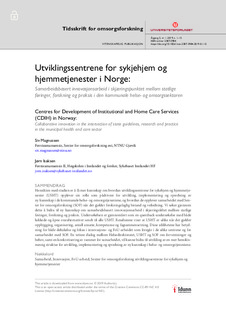Utviklingssentrene for sykehjem og hjemmetjenester i Norge : samarbeidsbasert innovasjonsarbeid i skjæringspunktet mellom statlige føringer, forskning og praksis i den kommunale helse- og omsorgssektoren
Journal article, Peer reviewed
Published version
Permanent lenke
http://hdl.handle.net/11250/2643252Utgivelsesdato
2019Metadata
Vis full innførselSamlinger
Originalversjon
Tidsskrift for omsorgsforskning. 2019, 5 (1), 1-15. 10.18261/issn.2387-5984-2019-01-10Sammendrag
Hensikten med studien er å få mer kunnskap om hvordan utviklingssentrene for sykehjem og hjemmetjenester (USHT) opplever sin rolle som pådrivere for utvikling, implementering og spredning av ny kunnskap i de kommunale helse- og omsorgstjenestene, og hvordan de opplever samarbeidet med Senter for omsorgsforskning (SOF) når det gjelder forskningsfaglig bistand og veiledning. Vi søker gjennom dette å bidra til ny kunnskap om samarbeidsbasert innovasjonsarbeid i skjæringsfeltet mellom statlige føringer, forskning og praksis. Undersøkelsen er gjennomført som en questback-undersøkelse med både lukkede og åpne svaralternativer sendt til alle USHT. Resultatene viser at USHT er ulike når det gjelder oppbygging, organisering, antall ansatte, kompetanse og fagsammensetning. Disse ulikhetene har betydning for både deltakelse og fokus i innovasjons- og FoU-arbeidet som foregår i de ulike sentrene og for samarbeidet med SOF. En tettere dialog mellom Helsedirektoratet, USHT og SOF om forventninger og behov, samt en konkretisering av rammer for samarbeidet, vil kunne bidra til utvikling av en mer hensiktsmessig struktur for utvikling, implementering og spredning av ny kunnskap i helse- og omsorgstjenestene. Nøkkelord: Samarbeid, Innovasjon, FoU-arbeid, Senter for omsorgsforskning utviklingssentrene for sykehjem og hjemmetjenester Abstract: The aim of the study is twofold: First, it aims to investigate how the Centre for Development of Institutional and Home Care Services (CDIH) experiences their role as a driving force for the development, implementation and dissemination of new knowledge in the municipal health and care services. Second, it aims to explore how the CDIH experiences the collaboration with the Centre for Care Research (CCR) and the research-related assistance and supervision they provide. We seek to provide new insights into cooperation-based innovation efforts in the intersection between governmental leadership, research and practice. The study draws on data from a questback survey with both closed and open-ended questions distributed to all CDIH departments. The results show that the CDIH differs in terms of structure, organization, number of employees and competence. This is important for research & development work in the various CDIH departments, and for cooperation with the CCR. A closer dialogue between the Norwegian Directorate of Health, the CDIH and the CCR about expectations and needs, as well as a concrete framework for cooperation, can contribute to the development of a more appropriate structure for the development, implementation and dissemination of new knowledge in the municipal health and care services.
Beskrivelse
© 2019 Author(s). This is an open access article distributed under the terms of the Creative Commons CC-BY-NC 4.0 License (http://creativecommons.org/licenses/by-nc/4.0/)

